Garden
Clusia Rosea (Autograph Tree) Care, Pruning, Growth, & Toxicity Guide Powered by FAQs
Clusia Rosea is known by many names among plant enthusiasts, but most people know it as the “Signature Tree”.
The secret behind this name is its redundant, fluffy and thick leaves that people have engraved on their names and seen growing up with those words.
There are many interesting facts about this tree, and dealing with it is effortless. Clusia rosea is an excellent choice if you want to add a new plant to your home.
Before you go to buy Clusia Rosea, read this fascinating and definitive guide to making a wise choice.
Clusia Rosea
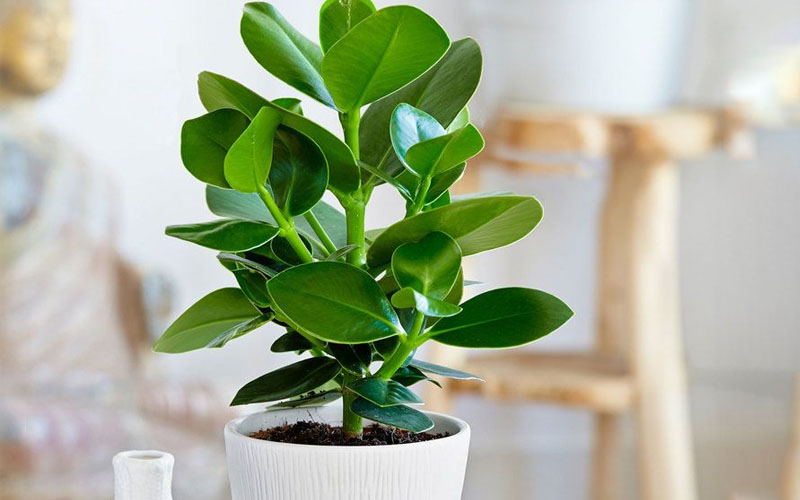
Clusia is the genus, while Clusia Rosea is the genus’ signature tree, tropical and subtropical plant species known by such names as kopey, cupey, balsam apple, pitch apple, and Scottish lawyer.
Some people call it Clusia major; however, it is not.
| Scientific Name | Clusia rosea |
| Genus | Clusia |
| Plant Type | Perennial evergreen |
| Blooming Season | Summers |
| Hardiness Zones | 10 to 11 |
| Famous Names | Autograph tree, Copey, Balsam Apple, Pitch Apple |
Why Should You Keep Clusia Rosea At Home?
Well, the exotic texture of this plant, along with its drought-tolerant ability, make Clusia Rosea an excellent choice for keeping in homes and growing in landscapes just like Jericho’s Rose.
Yeah! This plant can be grown perfectly indoors and outdoors. Wow!
Beautiful Teardrop Leaves Haver Clusia rosea Is Perfect Ornamental Choice:
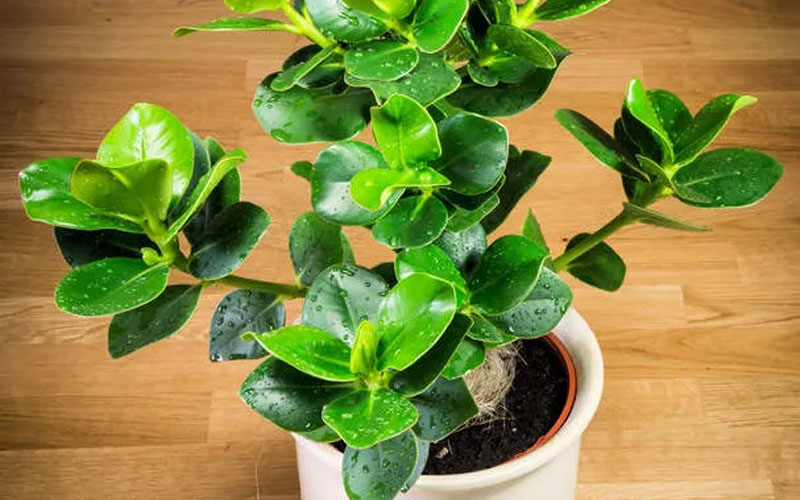
Although the genus Clusia has about 150 different species, the most common of all is Clusia Rosea.
Thanks to its tough, dark green and olive colored leathery leaves that can be carved and continue to grow up to 9 inches. You also know the little prostrate with fluffy leaves?
You can customize this tree by carving alphabets or names into the leaves and they will grow with the same engraved patterns.
It also produces white summer flowers followed by green fruits that turn black and split open when ripe. With all this, the birds love to eat their seeds.
If you love inviting birds into the home, the Clusia Rosea fruit will do that for you.
Clusia Rosea Care:
Balsam Apple, Pitch Apple or Clusia Rosea tree is famous for growing in homes.
If you live in the tropics and have suitable conditions, the signature tree can survive outdoors for you as well.
“The best time to plant a signature tree is Spring or Autumn.”
When you need to grow this plant, you will need:
1. Placement:
Placement: Sunlit room
A window that receives direct sunlight most of the day can be perfect for protecting this plant.
FYI, it can also tolerate partial shade, though you will need to habitually provide it with some sunlight as the beautiful Rosso plant.
For this, shift your plant according to the need and availability of the sun during the day.
2. Soil Requirement:
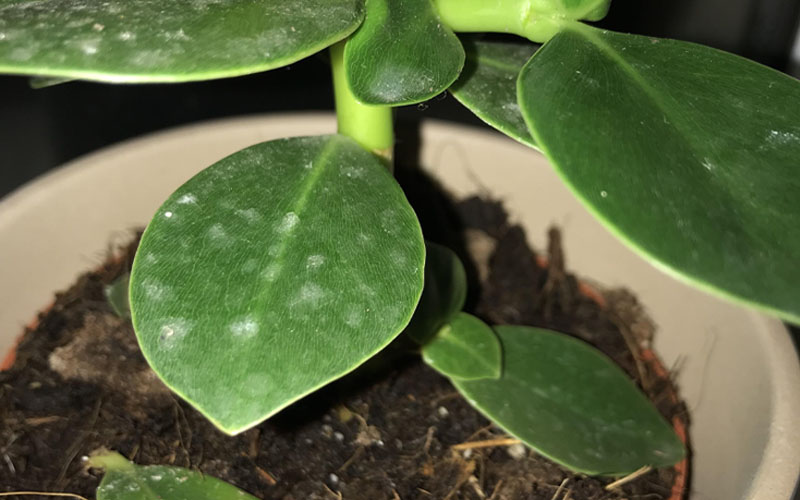
Soil: Fully organic, soft, sandy, well-draining potting mix
The Clusia Rosea tree is an epiphyte, like Peperomia Prostrata. These plants grow on the organics of other dead plants.
This means that soil made using potting mix and orchid medium needs to be highly organic. Also, the texture should be soft, sandy and well-drained.
3. Humidity + Temperature:
High Temperature: Between 60 and 85 degrees Fahrenheit
Epiphyte plants love moisture and cannot tolerate moderate to low temperatures.
When keeping these plants indoors, you need to keep the temperature high inside. Otherwise, the plant will not grow according to expectations.
Results:
By keeping the 3 tips mentioned above in mind, your plant will prosper and show pleasant and satisfying growth.
Clusia Rosea Everyday Care:
Seeing your plant growing doesn’t mean you’re done here. In fact, it’s time to ensure your plant stays well indoors by taking proper care measures.
What they are or how to care for the signature tree Rosea are found in the following lines:
- Keep up with the required amount of sunlight.
- Do not forget to move your plant to the window facing the sun.
- Always maintain humidity and temperature
That said, follow these steps when caring for your plant:
4. Watering:
This plant loves moisture and likes to drink water.
However, excessive watering is not possible at all. Many people make the mistake of overwatering their plants and rot their roots wet and moldy.
The plant requires regular watering; however, it is recommended to lightly mist the soil rather than soaking it and soaking it thoroughly with water.
Some precautions to be taken during irrigation are:
- Never use cold water for irrigation as it can cause your plants to shed leaves.
- Always water the plant early in the day rather than midday or evening.
- Early watering will help the water evaporate well during the day.
Finally, after a year, when mature, you can leave it with small drought sessions. The plant enjoys doing this. You can also avoid this if you want your plant to sprout faster.
Tip: So if you forget to water once, don’t over-water the next day; It can cause brown spot disease in your plant.
5. Fertilizing Requirement:
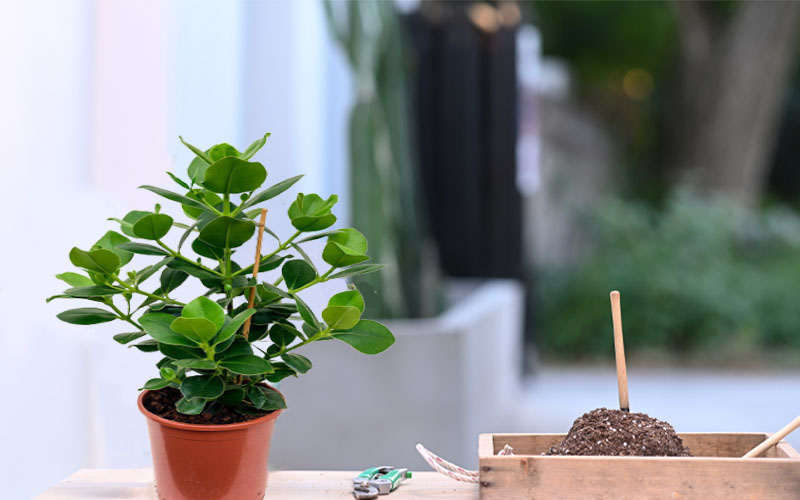
Fertilizing: Three times a year during the growing seasons
This plant loves moisture and sprouts well in summer and spring, but requires at least one fertilizing during the fall season.
Organic fertilizers diluted equally with liquid fertilizers should be used once a season in spring, summer and autumn.
6. Repotting Your Plant:
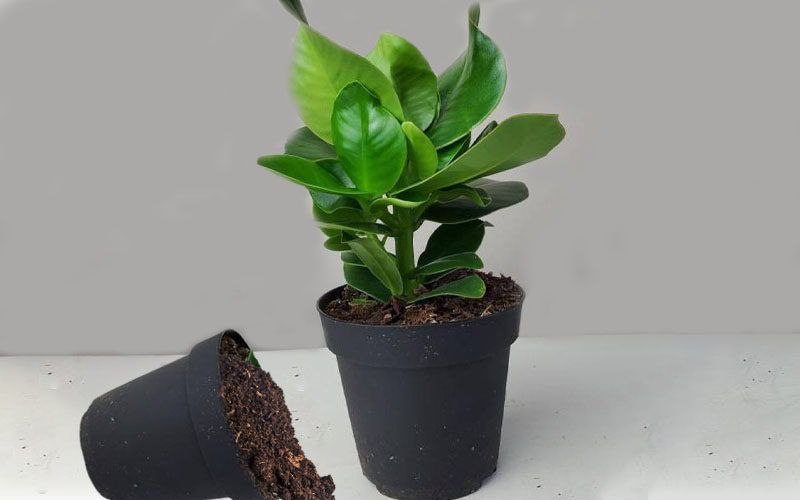
The signature plant, or clusia Rosea, spreads out more than growing upwards when mature. Therefore, the roots get wider.
In this case, the plant may require occasional repotting. You can move this plant to outside soil with a pH level of 10 to 11 when mature.
| Mature Size | 8 to 10 feet tall and wide (can reach 25 feet tall as a tree) |
| Flower Color | White or pink |
| Leaf Type | Thick, dark green, or olive-colored |
| Fruit | Black when matures |
For indoor transplants, on the other hand, choose a larger pot than before and make sure the plant is transplanted during the growing season so that it easily acclimates to the new soil.
Maintain Humidity:
In order for it to sprout well and disease-free, you need to maintain the humidity around your plant over the long term.
So, if you are seeing the humidity or temperature around your plant drop, you can maintain the humidity using these three different ways:
- Mist with a spray bottle when the sun is shining to create a moisture effect
- Use pebble water trays and place the plant pot in it to create moisture.
- Use natural moisturizers for moisture
Propagating Autograph Tree:
Clusia Rosea, or the signature tree, can be propagated by seeds as well as stems.
To reproduce from the stems, you can cut the branches and plant them in pots. The plant will multiply very quickly and you can repeat the branch cuts as many times as you need to create a collection of signature tree crops.
Clusia Rosea is Toxic:
The fruit of the plant is green when new and is poisonous to birds, animals and children. Therefore, you will need to keep your children and pets away from this plant.
In case of ingestion, the fruit can cause severe stomach irritation, diarrhea, vomiting, etc.
When watering your plant, do not allow fruit or leaf sap to come into contact with your skin, as it has also been reported to be a skin irritant.
Remember: Clusia Rosea berries are not edible
Bottom Line:
Do you love succulents and herbs that can be grown effortlessly at home? Check out our garden collection as we have many suggestions for you.
Before leaving, tell us a few words for feedback.
Have a nice day!